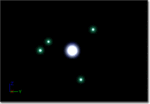Antipasta
“If antipasta and alphabet spaghetti were to come into contact it could spell disaster for us all.”
In Pasticle Physics, antipasta is composed of anti-ingredients in the same way that pasta is composed of ingredients. For example, an antiegg and some antiwheat with a bit of antiwater can form an antipasta dough. It is potentially life-threatening to consume antipasta without extreme safety measures and a bit of luck. This is because when an anti-food particle comes into contact with a positive particle (for example a human's tongue) the two particles annihilate each other releasing a tremendous amount of energy (the equivalent of 1,000,000 spurts of explosive diarrhea after bad Mexican food). This means the more antiparmesan you add onto a mountain of antispaghetti, the more likely your body will paint the walls and ceiling before you finish eating it. Whilst an exciting, even an arousing proposal, it is a little too dangerous for most people (even if you have a little chub just thinking about anti-tortelini) and seen as reckless and hedonistic by conservative foodies.With excessive care, one can enjoy anti-rigatoni and most likely keep their stomach intact, their head on their shoulders and not shit out anti-blood.
History
Many theories surrounding antipasta were developed by Italian physicist Galileo Linguini which challenged pastacentric thinking. The Vatican was threatened by the idea that, for example, macaroni and anti-macaroni, when coming into contact with one another, would annihilate into nothingness. Only God can create nothingness (he said while adjusting his pointy hat, long dress-like robe and golden shoes). Over time, as public attitudes shifted, the church had to accept that antipasta was a thing, and a thriving trade in antipasta culinary excellence spread throughout the world which the Vatican capitalised on by blessing as a new holy food and charging money for. Even bishops eat it in their studies and give a piece of anti-spaghetti or two to the child slaves they keep in a cage under their beds. The first Michelin Star restaurant to serve antipasta was Chez Le Snob in Marseille, where special plates were designed to avoid explosions with antifood contact. Since then, humanity has developed ways for humans to eat antipasta without the complete decomposition of their body matter or taking out an entire city block to satisfy a luxury craving.
Its popularity has grown wildly recently with pop-up antipasta shops having an eighty percent chance of remaining structurally sound by the time their business fizzles out (a week after the foodie Instagram have gotten bored). Twenty percent of restaurants and pop-ups collapse into rubble; however, the buildings are well-insured as a dish of antipappardelle with antibolognese sets one back an easy €2,000 in Rome.
Origin and asymmetry
Almost all pasta observable from the Earth seems to be made from pasta rather than antipasta. Many scientists believe that this preponderance of pasta over antipasta (known as Spaghettoid Asymmetry) is the result of an imbalance in the production of antipasta particles in the early universe, after its creation by the Flying Spaghetti Monster. One way of making sense of quantum-pasta-particles is the increasingly accepted theory that dark pasta accounts for a large percentage of the culinary mass of the universe, which explains why the universe is stretching faster and faster until the very dough of the universe might break. It is believed that antipasta particles spontaneously appear and disappear and that they exist in a probability wave which only collapses when it is consumed and tasted.
Consumption
Only anti-humans can eat antipasta without taking great efforts to avoid instant painful death. Galileo Linguini was the first to experiment with coating antipasta with a special substance (Unobtanium) which magically and inexplicably avoids the pasta exploding on contact with the mouth, a food plot which conveniently avoids unnecessary complication. Since then scientists have developed methods for people to consume dishes such as anti-lasagna where the unobtanium is somehow so fine-tuned to the human digestion process that the anti-food passes through the human stomach, intestines, bowels and anus without any direct contact with normal human matter. Special anti-toilets filled with anti-water need to be in place to avoid people's defecations becoming literal bombs as they hit the inner receptacle of the toilet. Anti-toilet paper made from anti-trees are literally sold by the square, so expensive are they. It is, of course, made of anti-wood pulp infused by unobtanium in a process we don't need to explain because unobtanium does the job.
Artificial production
Anti-spaghetti was reported in November 2009 to have been produced at the Large Carbonara Colander in Geneva. Its €50b price tag was a solid investment. The mysteries unlocked will allow people to have anti-gnocchi without tripling their life insurance premiums.
Vermicelli's corollary (his anti-colander)
Long has it been thought that pasta that does not conform to standards of Euclidean geometry. Dried antipasta prefers ecliptic and hyperbolic shapes which enable crevices in the space-time continuum which soak up stray rays of galactic particle steam, peppered with long strings of anti-quantum-pasta-plasma. Supporters of the String Theory maintain that long, linear strips of antipasta does not allow for this. Proponents of the Ravioli model put forward the theory that chunky "pockets" exist between two ionised layers of embedded multi-universes, speculating in a universal "omnipasta" or "multipasta".
Controversy
Despite the evidence provided for antipasta's existence, some groups remain sceptical as to its benefits to Culinary Science, and indeed, some even question whether it actually occurs naturally outside the laboratory. They point to the lack of physical evidence for other negatively-charged carbohydrates, such as anti-rice or the elusive Higgs-Beeferoni. Meanwhile, the rest of the world continues to enjoy their antipasta, carefully prepare it in a highly controlled kitchen, consume it whilst avoiding any chewing, sit down for ten hours whilst it digests and then ensuring their last testament and will is in order before shitting it out. It is a glorious anti-experience and one not even the skeptics can take away.





